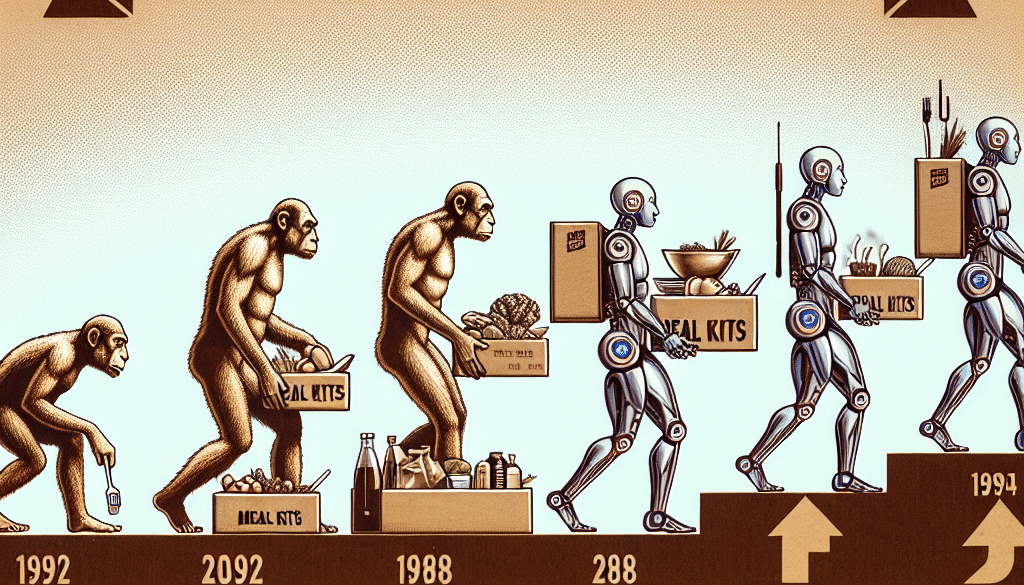Meal Kits Evolution: Retail and Restaurant Market Trends
-
Table of Contents
- Meal Kits Evolution: Retail and Restaurant Market Trends
- The Rise of Meal Kits
- Impact on Retail
- Meal Kits and the Restaurant Industry
- Current Trends and Future Outlook
- Customization and Dietary Preferences
- Technology and Personalization
- Sustainability and Ethical Sourcing
- Global Market Expansion
- Case Studies and Statistics
- Conclusion
- ETprotein: Enhancing Meal Kits with Quality Proteins
Meal Kits Evolution: Retail and Restaurant Market Trends

The food industry has witnessed a significant transformation over the past decade, with meal kits emerging as a revolutionary concept that has reshaped the way consumers approach dining. Meal kits are pre-portioned and sometimes partially-prepared food ingredients and recipes to prepare homecooked meals. This trend has seen a surge in popularity due to the convenience, variety, and health benefits they offer. In this article, we will delve into the evolution of meal kits, their impact on retail and restaurant markets, and the trends shaping their future.
The Rise of Meal Kits
Meal kits first gained traction as a niche offering, targeting busy professionals and families seeking a balance between home-cooked meals and the convenience of dining out. Companies like Blue Apron and HelloFresh pioneered this concept, providing customers with the ingredients and instructions needed to create chef-inspired dishes at home.
- Increased demand for healthy, home-cooked meals without the hassle of meal planning and grocery shopping.
- The desire for culinary exploration and learning new cooking skills.
- The rise of e-commerce and advancements in cold-chain logistics, making home delivery of perishable goods more feasible.
Impact on Retail
As meal kits have grown in popularity, traditional grocery retailers have taken notice. Supermarkets have begun to offer their own versions of meal kits, either by developing in-house brands or by partnering with established meal kit companies. This move has allowed them to tap into the meal kit market while leveraging their existing supply chains and customer base.
- Increased foot traffic in stores due to the availability of meal kits.
- Opportunities for retailers to showcase their private-label products within meal kits.
- Enhanced customer loyalty through the convenience of one-stop shopping for meal kits and other grocery items.
Meal Kits and the Restaurant Industry
The restaurant industry has also adapted to the meal kit trend, particularly in response to the COVID-19 pandemic. With dining-in restrictions, many restaurants pivoted to offering meal kits as a way to maintain revenue and keep customers engaged. These kits often include signature dishes that can be finished or assembled at home, providing a restaurant-quality experience with the comfort of dining in.
- Introduction of “finish-at-home” meal kits by fine dining establishments.
- Collaborations between meal kit services and renowned chefs to offer exclusive menu items.
- Expansion of delivery services to include meal kits alongside traditional takeout options.
Current Trends and Future Outlook
Several key trends are currently shaping the meal kit industry, indicating its potential for continued growth and innovation.
Customization and Dietary Preferences
Meal kit companies are increasingly offering options to cater to specific dietary preferences and restrictions, such as vegan, keto, paleo, and gluten-free diets. This level of customization is attracting a broader customer base who might have previously been excluded due to their dietary needs.
Technology and Personalization
Advancements in technology are enabling meal kit providers to offer highly personalized experiences. Through data analytics and machine learning, companies can tailor their offerings to individual taste preferences and nutritional requirements, enhancing customer satisfaction and retention.
Sustainability and Ethical Sourcing
Consumers are becoming more environmentally conscious, and meal kit companies are responding by prioritizing sustainable packaging and ethically sourced ingredients. This commitment to sustainability is not only good for the planet but also resonates with customers who value corporate responsibility.
Global Market Expansion
Meal kit services are expanding beyond their initial markets, entering new territories around the world. This global reach is introducing diverse cuisines and cooking techniques to consumers, further enriching the meal kit experience.
Case Studies and Statistics
Several case studies highlight the success of meal kits in both retail and restaurant sectors. For instance, Kroger’s Home Chef reported a 118% increase in sales in 2020, demonstrating the significant impact of meal kits on grocery retail. Similarly, restaurants like New York’s Eleven Madison Park launched a meal kit service during the pandemic, which allowed them to sustain their business while their dining room was closed.
Statistics further underscore the growth of the meal kit market. According to a report by Grand View Research, the global meal kit delivery services market size was valued at USD 10.26 billion in 2020 and is expected to grow at a compound annual growth rate (CAGR) of 13.0% from 2021 to 2028.
Conclusion
The evolution of meal kits represents a significant shift in consumer behavior and has had a profound impact on both the retail and restaurant industries. As these sectors continue to adapt and innovate, meal kits are likely to remain a staple in the culinary landscape. The trends of customization, technology integration, sustainability, and global expansion suggest a bright future for meal kits, with ample opportunities for businesses to thrive in this dynamic market.
ETprotein: Enhancing Meal Kits with Quality Proteins
As meal kits evolve, incorporating high-quality protein sources becomes increasingly important for companies aiming to meet the nutritional needs and preferences of their customers. ETprotein offers a range of organic bulk vegan proteins that can enhance the value of meal kits. Their products, including rice protein, pea protein, and various seed proteins, are characterized by a neutral taste and non-GMO, allergen-free attributes. With L-(+)-Ergothioneine purity over 98%, ETprotein’s offerings are ideal for meal kit companies looking to differentiate themselves in a competitive market.
About ETprotein:
ETprotein, a reputable protein and L-(+)-Ergothioneine (EGT) Chinese factory manufacturer and supplier, is renowned for producing, stocking, exporting, and delivering the highest quality organic bulk vegan proteins and L-(+)-Ergothioneine. They include Organic rice protein, clear rice protein, pea protein, clear pea protein, watermelon seed protein, pumpkin seed protein, sunflower seed protein, mung bean protein, peanut protein, and L-(+)-Ergothioneine EGT Pharmaceutical grade, L-(+)-Ergothioneine EGT food grade, L-(+)-Ergothioneine EGT cosmetic grade, L-(+)-Ergothioneine EGT reference grade and L-(+)-Ergothioneine EGT standard. Their offerings, characterized by a neutral taste, non-GMO, allergen-free attributes, with L-(+)-Ergothioneine purity over 98%, 99%, cater to a diverse range of industries. They serve nutraceutical, pharmaceutical, cosmeceutical, veterinary, as well as food and beverage finished product distributors, traders, and manufacturers across Europe, USA, Canada, Australia, Thailand, Japan, Korea, Brazil, and Chile, among others.
ETprotein specialization includes exporting and delivering tailor-made protein powder and finished nutritional supplements. Their extensive product range covers sectors like Food and Beverage, Sports Nutrition, Weight Management, Dietary Supplements, Health and Wellness Products, and Infant Formula, ensuring comprehensive solutions to meet all your protein needs.
As a trusted company by leading global food and beverage brands and Fortune 500 companies, ETprotein reinforces China’s reputation in the global arena. For more information or to sample their products, please contact them and email sales(at)ETprotein.com today.














